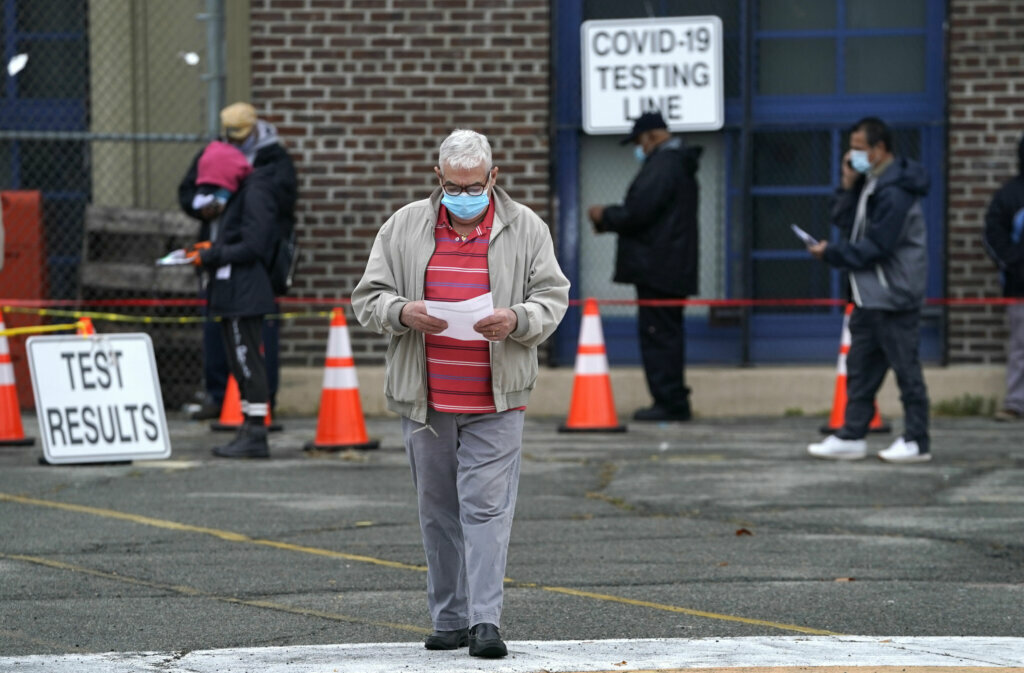
As the nation’s COVID-19 rates continue to climb, one doctor said he fears what the winter has in store if the country cannot all act together to combat the spread.
CBS News chief medical correspondent Dr. Jonathan LaPook told WTOP that he had been hoping the U.S. would be in a better spot controlling the spread of the coronavirus heading into the winter months.
“We have over 145,000 cases a day, hospitalizations at more than 65,000, we’ve topped 10 million in terms of total cases and 240,000 deaths,” LaPook said. “Remember at the beginning when we were talking about bending the curve? I think we’re at that same point right now — we’re at this inflection point.”
LaPook said the new treatments available to treat COVID-19, and the 90% efficacy of the Pfizer vaccine, are hopeful signs, but that the U.S. still has a long winter ahead.
“We’ve sort of got to bide time for the next few months so that we can keep the cases down and give it time for the vaccine to roll out — because the vaccine’s gonna take time to roll out over the course of 2021,” he said.
The best chance the U.S. has is to work together on limiting the spread of the virus, LaPook added.
- Sign up for WTOP alerts
- Latest coronavirus test results in DC, Maryland and Virginia
- 709,000 seek US jobless aid as pandemic escalates
- ‘It’s going to be long’: DC-area health officials on guard as COVID-19 winter approaches
- Virus surge breaking infection records across the US
- Coronavirus creates cloud of uncertainty over inauguration
- Hazard pay to work from home? Montgomery County seeks repayment of $100,000
- Charles County weighs tougher COVID-19 restrictions amid rising infections
Looking for more information? D.C., Maryland and Virginia are each releasing more data every day. Visit their official sites here: Virginia | Maryland | D.C.
“You hope that, for the first time, our country starts rowing in the same direction — we have not been rowing in the same direction,” LaPook said. “The CDC just came out with another report saying, ‘Look, these face masks not only protect other people, but it can protect you, too.'”
Improved availability and speed of testing would also go a long way toward controlling the spread of the virus, LaPook said.
“We really need to be able to have quick test … and I’m quoting [Dr. Anthony] Fauci … ‘You cannot tell me in the United States of America that we cannot develop a test that’s accurate, that you can get a result within five minutes, at home on a little piece of paper that you spit onto,'” he said. “And we should be able to have that frequently, because right now, people are having the same types of questions all the time: ‘Should I go to school? I’ve been exposed; do I know if I’m infected or not?'”
LaPook said the biggest struggle people have in understanding how the virus works is its long incubation period. Someone exposed to the virus could take anywhere from two to 14 days before becoming infectious — and any test done in that time period would come back negative.
“If we had just a test that we could do everyday, at home, that was accurate — think about what a difference that would make. We don’t have that yet,” he said.
LaPook added recent studies suggest that anyone who finds themselves indoors with another person who is not in their “pod” should be wearing a mask, even if they’re standing more than 6 feet apart.
Thanksgiving may also have to look a little different this year, according to LaPook.
“I know, for thousands of years, we’ve associated eating with socialization — maybe we need to turn a little bit of a screw in our heads and dissociate them for a while,” LaPook said. “Eat first, then get together and socialize with people.”








